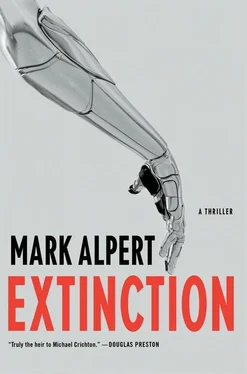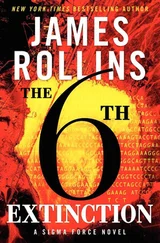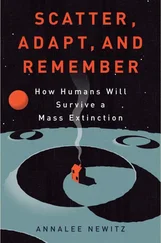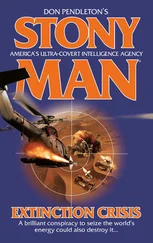Arvin leaned over the table and pressed a key on the laptop. Then he sat very still in his chair, staring at the audience. In a few seconds an image appeared on the screen overhead. The picture was fuzzy at the edges but clear at its center. It was a real-time image of the journalists and venture capitalists sitting in the front row of the auditorium. For a brief moment Jim saw himself on the screen. Every few seconds the image blacked out for an instant, disappearing in time with Arvin’s eyeblinks.
“This is my visual perception of the auditorium,” Arvin explained. “ The brain’s view , if you will, which is very different from a camera’s. Notice how my perception focuses on just one person at a time. And notice how quickly that center of focus darts around the room.” As Arvin surveyed the crowd, the image on the video screen leaped from one person to the next. “From a neuroscientist’s perspective, this is a remarkable breakthrough that will open up new avenues of research. Future studies can show us how animals perceive their environments. Or how schizophrenics view the world. But the potential for commercial applications is also remarkable. Watch this, please.”
Arvin leaned back in his chair and closed his eyes. The video screen went dark. After a few seconds, though, blobs of color flashed across the screen. Then a shape emerged, an image of a woman. It first appeared as a black-and-white silhouette and gradually became more detailed and colorful. The woman was heavyset and her hair was gray. She tilted her head and smiled, and then the image froze.
Arvin opened his eyes and pointed at the screen. “Do you recognize her?” he asked. “I didn’t expect you to. She was never famous. And she died more than twenty years ago.” He pressed a different key on the laptop and another image appeared on the screen, framed in a window just to the right of the smiling gray-haired woman. This second image was eerily similar to the first—it was the same woman in a slightly different pose. “She’s my mother, Irma Conway. The image on the right is a photo of her that I took in 1971. And the image on the left is my visual memory of her.”
The auditorium went dead silent. The crowd was too stunned to make a sound.
“Yes, I knew you’d be intrigued,” Arvin said. Once more he tapped the silver implant on his scalp. “The Dream-catcher allows us to download visual memories from the brain.”
The silence lasted for several seconds. Then someone started to clap. Others joined in, and soon the whole audience was applauding.
Arvin rose to his feet and moved upstage. “Amazing, isn’t it?” he exulted. “With this system we can retrieve all the images in our heads, every vivid fantasy and fleeting recollection and fondly remembered face. We’ll be able to archive every moment of our lives.”
The applause continued. Jim glanced at the journalists and businessmen in the crowd as they shared their delight in Arvin’s invention. The Dream-catcher was a potential bonanza, a technology that could make money in a hundred new ways. The venture capitalists were probably imagining the advertisements already: Store your memories on a hard drive! Share them on the Web! Although implanting a chip in the brain was major surgery, millions of people would surely pay for the privilege of retrieving their memories and broadcasting them to the world.
Jim, though, recoiled at the thought. He had no interest in reliving his memories.
Arvin beamed at the crowd, basking in their astonishment. But then he glanced at Jim again and his smile wavered. He abruptly turned to the left and mouthed a few words to someone offstage. Then he turned back to the crowd.
“Well, that’s the gist of it,” he said. “If any of you are seriously interested in investing in Singularity, please come forward and speak to our general counsel, who will provide you with a prospectus covering all the financial details. And now I’m sorry, but I must get back to my lab. Thank you all for coming!”
The audience applauded again. Arvin remained onstage for several seconds, waving at his admirers. Taking advantage of the moment, Jim advanced to the edge of the stage and called out to Arvin. But the old man ignored him and hurried toward the exit, escorted by a pair of bodyguards.
Jim had planned to buttonhole Arvin, but now he had a better idea. He rolled up his right sleeve and opened a small compartment hidden in the crook of his prosthetic arm. This particular prosthesis was equipped with a radio transmitter. Jim was an avid backwoods hiker, so he’d built the radio into the arm to give himself an emergency rescue beacon. But the transmitter could be useful in other ways. Turning one of the two knobs inside the compartment, Jim set the radio’s frequency at 13.56 megahertz. Because he’d helped to develop the implant technology, he knew this was the frequency used by Arvin’s miniature cameras to transmit their video to the retinal implants. Then he turned the other knob on the prosthesis and sent out a silent blast of radio noise.
Arvin stumbled as he walked across the stage. He had to grab one of his bodyguards to stop himself from falling. Jim had used electronic jamming to get his old professor’s attention. The radio noise from his prosthetic arm drowned out the visual signals going into Arvin’s retinal implants, temporarily blinding him.
As the crowd looked on, bewildered, Jim climbed onto the stage and stepped toward Arvin. He turned off his radio transmitter, but before the old man could gather his wits, Jim grabbed Arvin’s arm with his strong mechanical fingers.
“Thanks for making the time, old friend,” he said. “We need to talk.”
Layla crossed the Mexican border at Nuevo Laredo. She’d learned from her friends on the InfoLeaks network that the Mexican guards at the Laredo checkpoint were easy to bribe, and this turned out to be true. She got across the border after showing the guards her borrowed driver’s license and a couple of crisp hundred-dollar bills. Then she drove for another ten hours across the Sierra Madre. She finally reached a fishing village on Mexico’s Pacific coast, and soon she was bargaining in Spanish with an old toothless fisherman named Felipe.
Although Felipe didn’t look like much, he was a canny negotiator. He wanted five hundred dollars to take Layla on a one-hour excursion to a point in international waters, about twenty miles offshore. He obviously felt free to ask for a ridiculous sum because he assumed she was in the drug business, delivering either money or product to some smuggler in a speedboat. Slowly, patiently, Layla ratcheted the price down. She’d studied Spanish in high school and still remembered it pretty well. Her father, who’d learned Mandarin and Arabic while working overseas, had encouraged her to study those languages as well, but she never got around to it, and now she regretted her procrastination. It would’ve been nice to be able to read the Mandarin files that Dragon Fire had given her.
Felipe finally agreed to do the job for two hundred dollars. While he filled up an extra tank with gasoline, Layla found a safe place to leave the Honda and took the zippered pouch from the car. Then she and the fisherman headed out to sea. The boat was little more than a dinghy, but it had a new 100-horsepower engine. Layla sat in the bow, facing backward.
As she watched the shoreline recede, she thought of her father again. He’d always been so fanatical about her education. While other fathers read Dr. Seuss to their daughters, Layla’s father read Tolkien and Twain and Swift. When she was ten, he helped her build her first computer, using one device on his prosthetic arm as a soldering iron and another as a voltage tester. He spent nearly all his free time with her, forgoing friendshipes and hobbies and romances. Although his love for her had been suffocating at times, she’d always admired the way he’d responded to the deaths of her mother and brother. Instead of retreating into depression or bitterness, he’d dedicated his life to making things better.
Читать дальше












